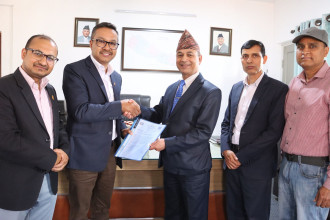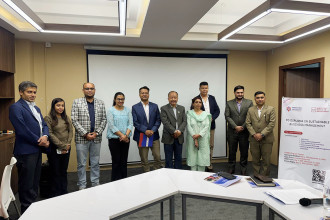-1733044046.jpeg)
KATHMANDU: Various stakeholders have emphasised the need to transform Nepal's first-time Sovereign Credit Rating score into an opportunity.
During an interaction on 'Managing the Economy', organised to mark the 28th anniversary of the Society of Economic Journalists-Nepal (SEJON), economic sector stakeholders noted that Nepal has achieved a 'double B-minus' score from the sovereign credit rating, which is encouraging for reaping benefits.
Deputy Prime Minister and Finance Minister Bishnu Prasad Paudel stated that it is a matter of pride for Nepal to rank second in South Asia after India. He stressed the need to transform potential into results. "I will take responsibility if problems have been added to the economy since the formation of this government," he asserted.
-1733044044.jpeg)
National Planning Commission (NPC) Vice-Chairman Shivaraj Adhikari said the country's sovereign credentials have sparked a positive debate. He opined that the next debate should focus on reforms. "There seems to be one reason for the economy's failure to move," he said, adding, "We have been having the same kind of debate for about six years, but today's situation is different." He noted that the situation is different from the past due to reduced interest rates, sufficient liquidity, and the government's efforts to promote the private sector.
Similarly, Nepal Rastra Bank (NRB) Governor Maha Prasad Adhikari said that although the credit rating shows Nepal ranking second in South Asia in terms of the overall economic situation, challenges still prevail. Governor Adhikari said efforts need to be made to improve the current standard of the sovereign credit rating. No policy provision has been amended in the first quarter review of the monetary policy as the economic and financial situation of the country is not different from the past, the governor noted.
Adhikari further stated that only monetary policy is not responsible for economic improvement. "All state agencies have an equal role to play in addressing the current crisis. The dependence on monetary policy should be reduced."
Economist Achyut Wagle said that new sources of revenue have not been found, putting the state in a weakening condition. Stating that the trend of revenue collection has decreased from around 25% of GDP to around 13%.
On the occasion, the SEJON Award 2081 was presented to economic journalist Sharad Ojha. Minister Paudel awarded Ojha, who works at clickmandu.com, a cash prize of Rs 100,000 for his report on the government's changes to Section 57 of the Income Tax Act through the budget and the errors therein.
-1733044046.jpeg)
-1733044045.jpeg)
-1733044046.jpeg)
-1733044045.jpeg)
-1733044045.jpeg)
SEJON also honoured economic journalists in various other categories on Saturday. Bhagawat Bhattarai of setopati.com received the Dr Bhola Chalise Liberal Journalism Award. The Print Media Award was given to Kaushila Kunwar of Karobar Daily, while Kamal Dhital of Bahrakhari.com received the Digital Award. Additionally, the winning team of the Swargiya Sagar Ghimire Memorial Futsal Competition was awarded cash prizes.



-1745407119.jpeg)


